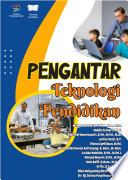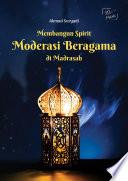
Pengantar Teknologi Pendidikan
Selamat datang dalam dunia yang penuh inovasi dan transformasi, di mana teknologi menjadi tiang yang membangun jembatan antara ilmu pengetahuan dan pembelajaran. Buku berjudul "Pengantar Teknologi Pendidikan" membawa Anda dalam perjalanan menggali potensi teknologi untuk memperkaya proses pendidikan. Seperti yang dikatakan oleh John Dewey, seorang filsuf pendidikan ternama, "Jangan sekedar mengajar murid secara mekanis, melainkan bawalah mereka untuk berpikir." Dalam konteks ini, teknologi menjadi katalisator yang memperluas ruang berpikir dan pembelajaran. Buku yang ditulis oleh dosen dan praktisi yang berkecimpung di ilmu Pendidikan ini menghadirkan berbagai materi menarik diantaranya: Konsep Dasar Teknologi Pendidikan, Integrasi Teknologi dalam Kurikulum, Perkembangan Teknologi, Tren dan Inovasi Terkini dalam Teknologi Pendidikan, Alat dan Media Pembelajaran, Desain Pembelajaran Berbasis Teknologi, Strategi Pembelajaran Berbasis Teknologi, Manajemen Teknologi Pendidikan, Implementasi Teknologi Pendidikan, Evaluasi Pembelajaran media digital, Peran Teknologi dalam Transformasi Pendidikan. Serta Implikasi Sosial dan Etika dalam Penggunaan Teknologi Pendidikan Semoga buku ini tidak hanya menjadi panduan, tetapi juga inspirasi bagi para pendidik, mahasiswa, dan siapa pun yang peduli terhadap masa depan pendidikan. Mari kita bersama menapaki jejak menuju transformasi pendidikan yang berkelanjutan.
- ISBN 13 : 6231003361
- ISBN 10 : 9786231003362
- Judul : Pengantar Teknologi Pendidikan
- Pengarang : Mohamad Mustari, Mohamad Mustari, Habib Zainuri, Aldila Krisnaresanti, Ja'far Amir, Vivina Eprillison, Mhd. Adi Setiawan Aritonang, La Ode Wahidin, Ahmad Nasori, Moh Safii, Erita Erita, Rika Mellyaning Khoiriya, Ratna Puspitasari, Habib Zainuri, Aldila Krisnaresanti, Ja'far Amir, Vivina Eprillison, Mhd. Adi Setiawan Aritonang, La Ode Wahidin, Ahmad Nasori, Moh Safii, Erita Erita, Rika Mellyaning Khoiriya, Ratna Puspitasari, Habib Zainuri, Aldila Krisnaresanti, Ja'far Amir, Vivina Eprillison, Mhd. Adi Setiawan Aritonang, La Ode Wahidin, Ahmad Nasori, Moh Safii, Erita Erita, Rika Mellyaning Khoiriya, Ratna Puspitasari, Habib Zainuri, Aldila Krisnaresanti, Ja'far Amir, Vivina Eprillison, Mhd. Adi Setiawan Aritonang, La Ode Wahidin, Ahmad Nasori, Moh Safii, Erita Erita, Rika Mellyaning Khoiriya, Ratna Puspitasari, Habib Zainuri, Aldila Krisnaresanti, Ja'far Amir, Vivina Eprillison, Mhd. Adi Setiawan Aritonang, La Ode Wahidin, Ahmad Nasori, Moh Safii, Erita Erita, Rika Mellyaning Khoiriya, Ratna Puspitasari, Habib Zainuri, Aldila Krisnaresanti, Ja'far Amir, Vivina Eprillison, Mhd. Adi Setiawan Aritonang, La Ode Wahidin, Ahmad Nasori, Moh Safii, Erita Erita, Rika Mellyaning Khoiriya, Ratna Puspitasari, Habib Zainuri, Aldila Krisnaresanti, Ja'far Amir, Vivina Eprillison, Mhd. Adi Setiawan Aritonang, La Ode Wahidin, Ahmad Nasori, Moh Safii, Erita Erita, Rika Mellyaning Khoiriya, Ratna Puspitasari, Habib Zainuri, Aldila Krisnaresanti, Ja'far Amir, Vivina Eprillison, Mhd. Adi Setiawan Aritonang, La Ode Wahidin, Ahmad Nasori, Moh Safii, Erita Erita, Rika Mellyaning Khoiriya, Ratna Puspitasari,
- Kategori : Education
- Penerbit : Yayasan Tri Edukasi Ilmiah
- Bahasa : id
- Tahun : 2024
- Halaman : 210
- Google Book : https://play.google.com/store/books/details?id=J_EIEQAAQBAJ&source=gbs_api
-
Ketersediaan :
Buku berjudul "Pengantar Teknologi Pendidikan" membawa Anda dalam perjalanan menggali potensi teknologi untuk memperkaya proses pendidikan.









